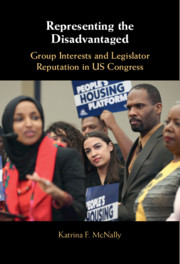Representing the Disadvantaged
The limited attention Congress gives to disadvantaged or marginalized groups, including Black Americans, LGBTQ, Latinx, women, and the poor, is well known and often remarked upon. This is the first full-length study to focus instead on those members who do advocate for these groups and when and why they do so. Katrina F. McNally develops the concept of an “advocacy window” that develops as members of Congress consider incorporating disadvantaged-group advocacy into their legislative portfolios. Using new data, she analyzes the impact of constituency factors, personal demographics, and institutional characteristics on the likelihood that members of the Senate or House of Representatives will decide to cultivate a reputation as a disadvantaged-group advocate. By comparing legislative activism across different disadvantaged groups rather than focusing on one group in isolation, this study provides fresh insight into the trade-offs that members face as they consider taking up issues important to different groups. This title is also available as Open Access on Cambridge Core.
Katrina F. McNally is an Assistant Professor at Eckerd College in St. Petersburg. She received her PhD from the University of Maryland, College Park.

